
PARIS — Pope Benedict XVI’s shock resignation has placed the spotlight on octogenarians at the forefront of politics and business, sometimes shouldering a workload that people 20 years their junior may shun.
News24.com/Agencies
The 85-year-old pontiff announced on Monday that old age had sapped him of the strength required to lead the world’s 1, 1 billion Catholics.
Yet the world’s stage is studded with contemporaries who prefer to hold on to the reins.
Rulers include President Robert Mugabe, turning 89 next week, Israeli President Shimon Peres (89), Britain’s Queen Elizabeth II, aged 86 and King Bhumipol Adulyadej of Thailand (85).
In the ranks of business, there is media tycoon Rupert Murdoch (81), TV and film magnate Sumner Redstone (89) and Hong Kong property supremo Li Ka-shing (84).
At 82, US actor and director Clint Eastwood is still going strong, while French Armenian singer and diplomat Charles Aznavour croons away aged 88.
In rich countries, a large number of octogenarians are in good health, said Francoise Forette, director of the French national Gerontology Foundation.
- Chamisa under fire over US$120K donation
- Mavhunga puts DeMbare into Chibuku quarterfinals
- Pension funds bet on Cabora Bassa oilfields
- Councils defy govt fire tender directive
Keep Reading
Figures for France show that only 17% of 80-plussers are made dependent by disease, she said.
Eyeing demographic trends, she said: “There are, and there will be more and more people aged 80 and over who are able to shoulder the heaviest responsibilities.”
But Forette and others also pointed to the growing health risks associated with ageing — and whether an individual actually wishes to carry on a demanding job at an advanced stage of life.
Last month, Queen Beatrix of the Netherlands cited her 75th birthday as a reason to step down, saying “our country should be in the hands of a new generation”.
Nelson Mandela, one of the world’s most respected statesmen, retired as president at the age of 81 in 1999 and from public life four years later as his health declined.
“You are not as energetic at 86 as you are at 40. When you reach that age, you are more fragile – fragile in your movements, fragile getting up,” Parisian gerontologist Olivier Henry said.
“Even walking is more difficult, as the muscles become weaker.” According to the World Health Organisation (WHO), the number of people aged 60 years and older has doubled since 1980 and is forecast to reach two billion by 2050 — a fifth of the planetary total. Almost 400 million of them will be aged 80 plus, the UN’s health agency says on its website.
“This population ageing can be seen as a success story for public health policies and for socioeconomic development, but it also challenges society to adapt, in order to maximise the health and functional capacity of older people as well as their social participation and security,” it states.
The health risks for the elderly are many: heart disease, stroke and chronic lung disease, visual and hearing loss, dementia and osteoarthritis… the list is long.
They also sleep less and tire more easily — something that is particularly hard to handle when one’s workload includes as much globetrotting as that of a Pope.
Old age can also be “a time of discouragement” as old friends and associates pass away, “and can lead to depressive syndromes,” said Henry.
“There is not necessarily one reason, but possibly a series of little reasons that cause one at a given moment to say: ‘Stop!’”
Meanwhile, two cardinals from Africa, a Canadian and an Italian are among those being tipped to succeed Pope Benedict XVI. With Pope Benedict XVI’s resignation, speculation about who might succeed him when the conclave meets in March has begun. Any baptised Roman Catholic male is eligible for election as pope, but only cardinals have been selected since 1378. Among those who have been mentioned as potential successors are Ghanaian Cardinal Peter Turkson, a TV star, “people’s person” and a “wonderful” priest. Cardinal Marc Ouellet of Canada; Cardinal Francis Arinze of Nigeria and Italian Cardinal Angelo Scola.











